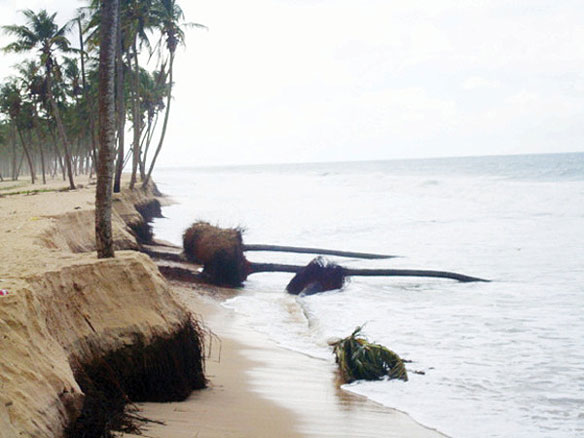The Lagos State Government says it will plant one million coconut seedlings along its 135-kilometre Badagry to Ibeju-Lekki coastline to replace old and unproductive trees as well as mitigate the shrinking coast line.

General Manager, Lagos State Coconut Development Authority (LASCODA), Mr Dapo Olakulehin, told the News Agency of Nigeria (NAN) in Lagos that the coast line had shrunk due to human activities.
Olakulehin spoke with NAN after a joint fact-finding mission to the LASCODA’s formation and coconut plantations in Badagry undertaken in collaboration with General Manager, Agricultural Land Holding Authority, Mr Dapo Are.
The LASCODA boss said part of the mission was to consolidate government agriculture land holdings as well as arrest encroachment on the land.
He said the target was to plant one million coconut trees on the coastline from Badagry to Ibeju-Lekki to replace the old and unproductive trees.
Olakulehin described the coconut belt as important economic, cultural, historical and environmental resources of about 10,000km coastline of West Africa stretching from Senegal, Gambia, Cameroon and Equatorial Guinea to Nigeria.
According to him, the coconut belt serves as natural buffers, which shields the mainland from the ocean, adding that no other tree crop could effectively serve as barrier between the land and ocean like it.
He said that the coconut belt was shrinking daily due to human activities, thus negatively affecting the environment while the old trees were also not effectively serving the purpose of why nature put them there in the first instance.
“The Lagos State Government under the administration of Mr Babajide Sanwo-Olu is ready to reverse this trend by massively repopulating the coconut belt in Lagos through multi-agency and inter-ministerial cooperation.
“This will be done with the active involvement of the private sector and the communities along the coastline.
“The major sources of livelihood of most coastal communities along this stretch are fish and coconut value chains.
“Of this stretch, Nigeria has close to 1,000 km in which 180km belongs to Lagos State; square meter per square meter, Lagos section of the stretch has highest number of coconut trees than any other location along the coastline of West Africa.
“No wonder, Badagry and Lagos Island Divisions of Lagos State are economically, culturally and socially associated with coconut from time immemorial,” he said.
The LASCODA boss said the strategies to stop further loss of such lands to unauthorised persons had begun as illegally occupied portions would be reclaimed without delay.
“We want to do it consciously; we want to reclaim the land but we need to carry communities along the area along and we are starting almost immediately to rehabilitate the coconut belt along the coastline.
“The coconut trees along the ocean belt is a natural shield to the ocean, but these coconut trees are reducing every day and that is why we are having ocean surge and other environmental challenges.
“Our objective is to restore the coconut back to its old place by the ocean belt,” he said .
Olakulehin said the belt was about 180 kilometers, adding that part of it had been taken over by the Nigerian Ports Authority and some jetty.
“We are sensitising the communities on the project because we want them to take ownership of the crop,” he said.
By Olayinka Olawale
